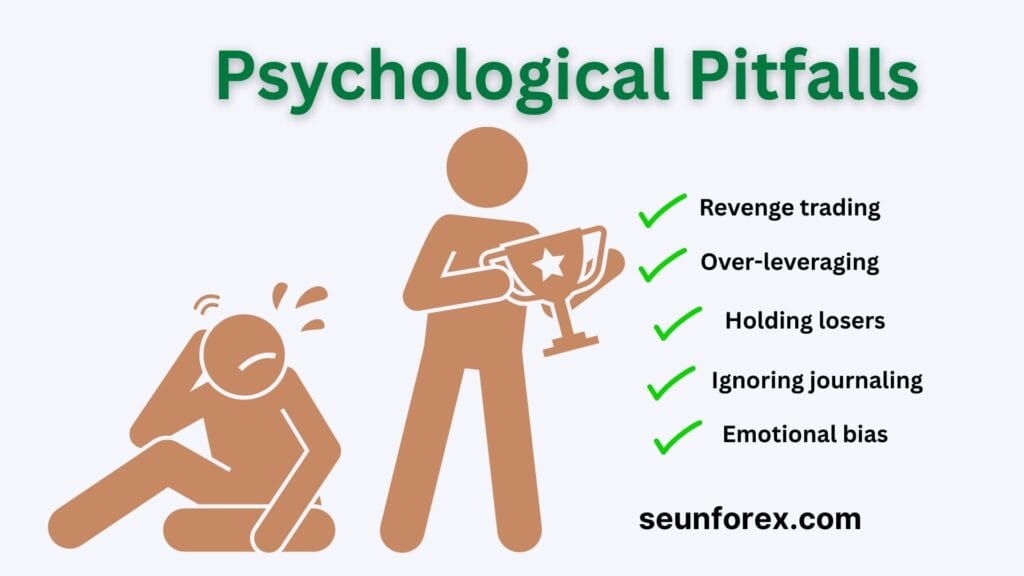
“Forex trading isn’t won by charts alone — it’s won in the mind.” — Adapted from classic Wall Street mindset
Forex trading is often misunderstood as a purely technical skill. Charts, indicators, and strategies matter, but forex trading psychology ultimately shapes your results. Your forex trading mindset influences every decision you make in the market.
Your mind can either be your greatest asset or your deadliest liability. That’s why mastering forex trading psychology is essential for building consistent trading results, reducing emotional mistakes, and developing stronger emotional control in trading.
A trader who lacks forex trading discipline strategies will always struggle, no matter how advanced their technical system is. But with the right psychological framework, you can strengthen your mindset, control fear and greed, and execute your edge with consistency.
This in-depth guide will walk you through the core elements of forex trading psychology, providing practical steps to improve your trading mindset, build discipline, and apply emotional control in trading to achieve long-term, consistent trading results.
1. Introduction: Why Psychology Matters in Forex
Many new traders spend months, even years, learning indicators, chart patterns, and strategies. They watch YouTube tutorials, read books, and study trading systems. But here’s the reality:
Most traders fail not because they lack strategy, but because they lack psychological control.
Your mindset affects:
- Decision-making – The trades you take (or avoid) are influenced by emotions.
- Risk management – Fear and greed can override rational position sizing.
- Longevity – Traders who cannot control their psychology burn out or blow accounts quickly.
Think of trading like the Wall Street “thrust” concept: markets give signals, but your mind must be ready to act without hesitation or panic.
By mastering forex trading psychology, you create consistency, resilience, and clarity in an unpredictable market.
2. Core Principles of Forex Trading Psychology
To succeed psychologically, you must master four core principles:
- Emotional Awareness – Recognize how fear, greed, and hope influence your trades.
- Cognitive Control – Avoid biases and mental shortcuts that cloud judgment.
- Discipline – Stick to a trading plan consistently, regardless of short-term outcomes.
- Consistency – Small, repeatable actions compound into larger results over time.
“Discipline separates the profitable trader from the hobbyist.”
By internalizing these principles, you create a foundation that supports not only your trades but also your long-term financial growth.
3. The Role of Emotions in Forex Trading
Emotions are unavoidable. The key is managing them effectively:
- Fear – Can cause premature exits or avoidance of trades.
- Greed – Encourages over-leveraging, chasing profits, and impulsive decisions.
- Hope – Holding losing trades in the hope of a rebound.
Pro Tip: Treat emotions as signals, not instructions. Notice the feeling, but don’t act immediately. Pause, breathe, and then follow your plan.
4. Cognitive Biases That Sabotage Traders
Cognitive biases are mental shortcuts that often mislead traders. The most common include:
| Bias | Effect on Trading | How to Overcome |
|---|---|---|
| Confirmation Bias | Only sees info that supports your trade | Review opposing views, use objective criteria |
| Recency Bias | Overweights recent wins/losses | Use long-term performance metrics |
| Loss Aversion | Fears losses more than seeking gains | Accept losses as part of trading |
| Overconfidence | Takes excessive risk after wins | Stick to predetermined risk limits |
| Anchoring | Bases decisions on arbitrary numbers | Reassess based on market conditions |
By understanding these biases, you can actively prevent them from affecting your trading decisions.
5. Discipline vs. Impulse: Building Mental Resilience
Discipline is the backbone of forex trading psychology:
- Define strict entry and exit rules.
- Use fixed risk percentages per trade (e.g., 1–2% of account).
- Avoid impulsive adjustments due to short-term market swings.
- Respect your stop-losses.
Psychological strength grows like a muscle. Train it daily, and over time, it becomes automatic.
6. Handling Losses Without Panic
Losses are inevitable in forex trading. Your reaction determines long-term success:
- Accept small losses as the cost of learning.
- Keep a loss journal to analyze emotional triggers.
- Step back after an emotional trade — take a break or meditate.
- Avoid revenge trading; chasing losses often leads to bigger mistakes.
Remember: even the best traders experience losses. The difference lies in how they respond.
BROKER RECOMMENDATION: Managing losses requires a broker with reliable execution. I use IC Markets for their tight spreads and instant order processing – crucial for maintaining psychological composure during drawdowns.
7. Greed & Overtrading: Avoiding the Trap of Excess
Greed can be fatal:
- Avoid chasing profits after a winning streak.
- Stick to your pre-defined trade frequency.
- Set clear profit targets and risk limits.
- Take partial profits to reduce psychological pressure.
“Greed transforms calculated risk into reckless behavior.”
TOOL SUGGESTION: To combat overtrading, I recommend starting with Exness for their demo accounts. Practice discipline with virtual funds before risking real money.
8. Building a Winning Trading Routine
A professional trading routine stabilizes psychology:
- Pre-market analysis checklist – Check news, price levels, and indicators.
- Daily journaling – Record every trade, reason, and emotional state.
- Weekly review – Identify patterns, mistakes, and improvement areas.
- Mindfulness exercises – Meditation, breathing, or short walks to clear your mind.
Consistency in routine builds confidence and reduces emotional interference.
9. Mindset Frameworks of Successful Forex Traders
Successful traders share common mental frameworks:
- Growth Mindset – Losses are learning opportunities, not failures.
- Process Orientation – Focus on execution quality, not only profits.
- Patience – Wait for high-probability setups; don’t force trades.
- Detachment – Detach self-worth from trading results.
Emulating these frameworks strengthens your forex trading psychology.
10. Journaling & Self-Review: Your Psychological Feedback Loop
Journaling is the ultimate self-awareness tool:
- Record entry/exit points, strategy, and emotions.
- Review weekly to detect recurring behavioral mistakes.
- Adjust strategy based on patterns, not impulses.
Tip: Include screenshots of trades in your journal to spot subtle mistakes.
11. Stress Management Techniques for Traders
Stress impacts decision-making more than most traders realize:
- Physical exercise – Boosts mental clarity and energy.
- Proper sleep – Sleep deprivation reduces emotional control.
- Breathing techniques – Box breathing or 4-7-8 methods calm the nervous system.
- Mindfulness meditation – Focus on present moment to reduce anxiety.
Stress management enhances psychological resilience and trade execution.
12. Goal Setting & Performance Metrics
Psychologically healthy traders measure progress beyond profits:
- SMART goals: Specific, Measurable, Achievable, Relevant, Time-bound.
- Track consistency, risk adherence, and execution quality.
- Reward process achievements, not just financial wins.
“Focus on your effort, not only the outcome.”
13. Visualization & Mental Rehearsal Techniques
Visualization strengthens confidence and discipline:
- Mentally rehearse executing trades flawlessly.
- Imagine staying calm during drawdowns.
- Practice visualizing correct responses to market surprises.
Over time, visualization programs your mind to act rationally under pressure.
14. Combining Psychology with Strategy: The Complete Trader
- A strong strategy without psychology = early burnout.
- Psychology without strategy = random results.
- Combining both = sustainable profitability.
Use clear rules, emotional control, and measurable goals to execute trades effectively.
15. Common Psychological Pitfalls & How to Avoid Them

| Pitfall | Solution |
|---|---|
| Revenge trading | Step back, review your trading plan |
| Over-leveraging | Use strict risk percentage per trade |
| Holding losers | Pre-set stop-losses and adhere to them |
| Ignoring journaling | Record daily and analyze weekly |
| Emotional bias | Recognize feelings, pause before trading |
16. Case Studies of Psychological Wins & Fails
Win Example:
A trader accepts a small loss, maintains composure, and capitalizes on the next high-probability setup, increasing account balance steadily.
Fail Example:
A trader chases profits after a winning streak, doubles risk, and experiences a large drawdown, emotionally overwhelmed and deviating from the plan.
Lesson: Emotion control is more important than intuition alone.
🚀 Ready to Apply These Psychology Principles?
Choose Your Path:
Beginner Friendly → Exness
- Perfect for practicing emotional control with small positions
- User-friendly platform reduces stress
Serious Trading → IC Markets
- Professional execution for disciplined traders
- Essential for implementing advanced psychology techniques
Prop Firm Ready → FTMO / Maven
- Scale your mastered mindset with firm capital
17. Conclusion: Becoming a Mindful, Profitable Trader
Forex trading psychology is not optional—it’s essential. Mastering emotions, biases, and discipline creates sustainable profits and reduces stress.
“Charts tell the story. Psychology writes the ending.”
By following this guide, you can develop the mindset of a professional trader, capable of making calm, calculated, and profitable decisions in any market condition.
💡 Want to take it a step further? Check out our detailed Prop Firm Challenge Guide to learn how to apply disciplined psychology and strategy in real funded trading challenges. Discover step-by-step methods, risk management tips, and practical strategies that can turn your trading mindset into tangible results.
Quick Self-Assessment: Which emotion affects your trading most?
- [ ] Fear of losing
- [ ] Greed for more profits
- [ ] Impatience with waiting
- [ ] Hope during losing trades
Ed Seykota – Market Mindset Principles
Mark Douglas – Trading in the Zone
Brett Steenbarger – The Psychology of Trading
Wayne Whaley – Planes, Trains and Automobiles (Market Thrusts)